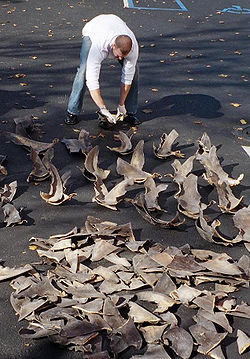 Photo: Robert HuffstutterCheers rang out across the Twitterverse on Tuesday when the California Senate passed legislation banning the possession, sale, or trade of shark fins, and sent the measure upstream for Gov. Jerry Brown’s signature. If signed into law, California would join Hawaii, Oregon, and Washington, where similar bans have already been enacted.
Photo: Robert HuffstutterCheers rang out across the Twitterverse on Tuesday when the California Senate passed legislation banning the possession, sale, or trade of shark fins, and sent the measure upstream for Gov. Jerry Brown’s signature. If signed into law, California would join Hawaii, Oregon, and Washington, where similar bans have already been enacted.
The gruesome practice of shark finning has made headlines for some time: Scientists estimate that 73 million sharks are caught a year. Their fins are then brutally sliced off and they are tossed back into the water to die. The results are catastrophic: Of 400 known shark species, over 100 of them have experienced steep population declines, and many are considered threatened or endangered.
The vast majority of shark-fin soup is eaten in Asia, where it serves as a symbol of wealth in Chinese culture. But a California ban could also make a real impact. California is home to two of the largest Asian food markets outside of Asia, and its residents consume more shark fin than any other state. That said, there is one obvious downside, laced with unintentional irony: Commercial fishermen in California — who catch sharks in a well-managed fishery and currently have a market for the whole animal — will now have to toss the fins.
“The fishermen in California make money off the meat,” says Jonathan Hardy, a consultant working with California commercial fishermen. “Their ability to sell the fins is a way to fill a niche market, and it’s a way to use the entire shark.”
Should the ban be signed into law, this group of fishers will face a 10-20 percent cut in revenue, because legally harvested fins will now be required to go to waste.
“Because of the passing of the legislation, it’s implied that the California commercial fishermen participate in the wasteful practice of shark finning, but they don’t,” says Hardy. “The legislature and environmental community should recognize the efforts of the management agencies and fishermen to increase our shark stocks like the common thresher shark, which is a perfect example of a fishery done right.”
Hardy has a point. The California thresher shark fishery demonstrates how government agencies like the National Marine Fishery Service and the Pacific Fishery Marine Council have worked closely with fishers and environmental groups to establish catch levels, protect pupping grounds, and ensure the viability of the stock (in the thresher’s case, that stock is actually increasing).
Thresher sharks are one of the five most commonly targeted or incidentally caught species of sharks in California — along with mako, soupfin, Pacific angel, and spiny dogfish sharks.
Overall, shark fins caught this way make up a very small percentage of the fins eaten in California, where Hardy estimates that at least 95 percent of the fins come from abroad. And it’s probably a baby that’s worth tossing out with the bath water, if regulators can truly keep imported fins from being distributed and sold on the black market.
On a federal level, it’s important to note that an amendment to the Magnuson-Stevens Fishery Conservation and Management Act in 2000 already prohibited finning, and required any U.S. vessels in possession of shark fins to also be in possession of the carcasses. Earlier this year, President Obama signed H.R. 81 into law, which closed loopholes in the early legislation that unintentionally allowed vessels to transport illegally obtained fins.
But there’s still nothing stopping purveyors in landlocked states like Nevada and Arizona from importing shark fins. In the end, federal legislation on shark-fin imports from countries that support illegal finning would make a much stronger statement than restrictions that impact domestic fishing practices. Best of all would be a ban that recognized the complexities of shark finning and allowed for a place for sustainable, whole-animal fishing.



